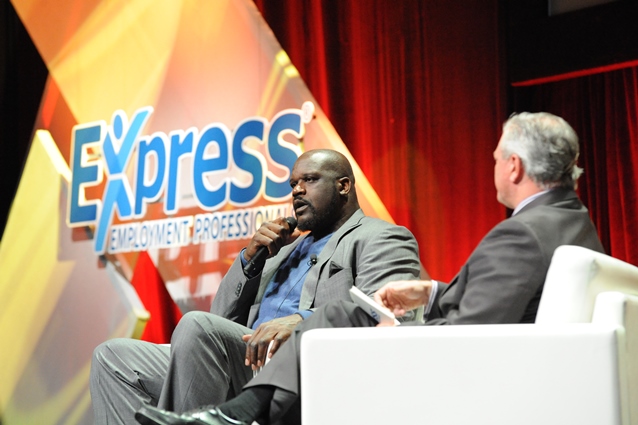 Earlier in the year, Movin’ On Up caught up with television sports analyst and 15-time NBA All-Star Dr. Shaquille O’Neal to ask his advice on job searching, overcoming failure, and achieving goals. We hope you enjoy this Q & A with Shaq.
Earlier in the year, Movin’ On Up caught up with television sports analyst and 15-time NBA All-Star Dr. Shaquille O’Neal to ask his advice on job searching, overcoming failure, and achieving goals. We hope you enjoy this Q & A with Shaq.
Movin’ On Up: What is your best advice for job seekers?
Shaq: Go for the gusto. Have drive and be innovative. Be willing to take on other opportunities. Not everyone in life has the dream job they want, but take a job and gain experience. The more experience you have, the more jobs you can get. Get another job and you will have two types of experience. Get another job and you will have three types of experience. The next time you see a job you want, you will have much more to put on your resume. Getting to that dream job is about gaining more experience.
Movin’ On Up: What advice would you say to young people starting out in their career who feel like they may have failed?
Shaq: You don’t get anywhere focusing on the problem. Focus on the solution. You have to memorize that solution and put it in the solution part of your brain, because you never want to make that mistake again. Abraham Lincoln lost eight times in his attempts for public office before he became President of the United States. In basketball, Jerry West, who retired from a career with the Los Angeles Lakers, went to the NBA finals nine times before winning an NBA championship. Use failure as motivation.
Movin’ On Up: What would you tell job seekers about achieving goals?
Shaq: Everything in my life I have pictured. I have started something in my life I call “dreams full of attraction,” similar to the law of attraction. My mother told me early in life to dream about what I want and go for it. There are two things in life that are going to happen: 1) it is going to happen or 2) it is not going to happen. If you quit and give up, the chances of your dream happening are slim. If you keep going, there is a 50-50 chance to achieve your dreams. In my case, it is an 80-20 chance because I have the mentality that I will never, ever be denied.
If you have advice you’d like to share about a successful job search, overcoming a failure, or how you achieve an important milestone in your career, please share it with us in the comments section below.
Movin’ On Up is brought to you by Express Employment Professionals.





